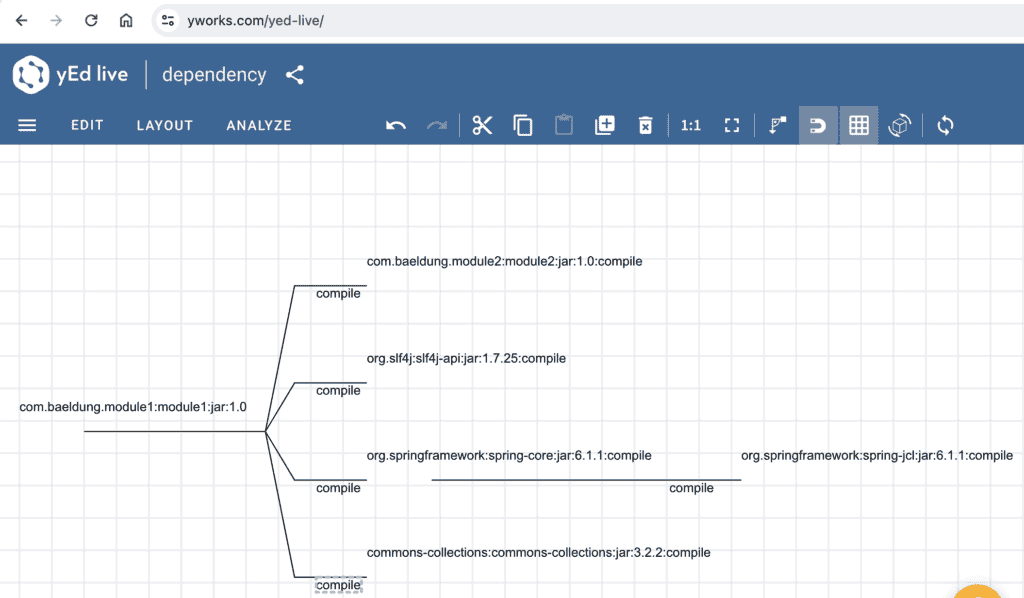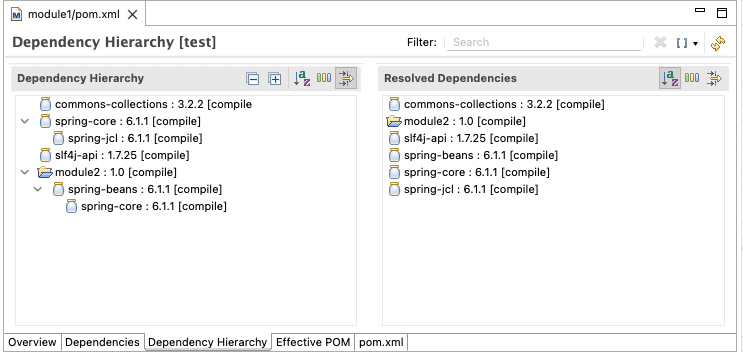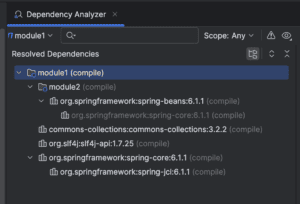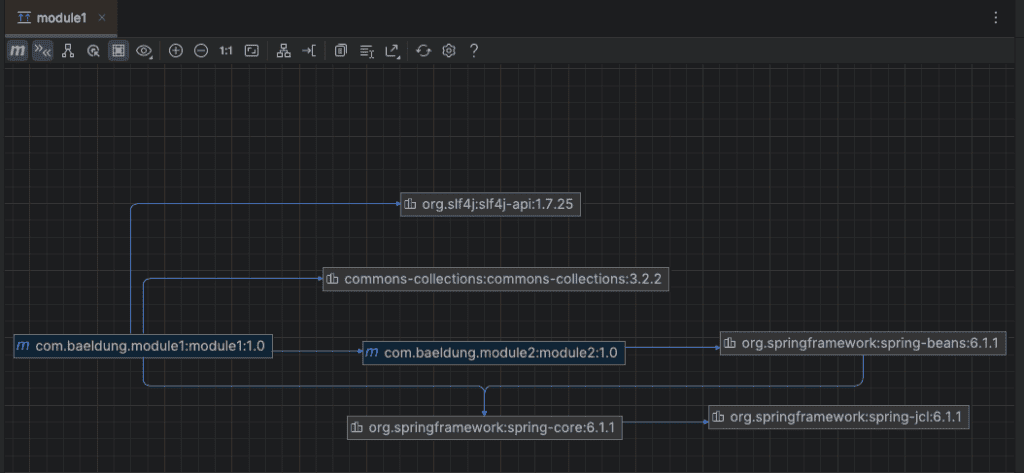2. 项目准备
在实际项目中,依赖树会迅速膨胀并变得复杂。但为了演示,我们创建一个包含两个模块的小型项目:module1 和 module2,每个模块引入 2-3 个依赖。此外,module1 依赖 module2。
首先创建 module2,添加以下依赖:
<dependencies>
<dependency>
<groupId>commons-collections</groupId>
<artifactId>commons-collections</artifactId>
<version>3.2.2</version>
</dependency>
<dependency>
<groupId>org.slf4j</groupId>
<artifactId>slf4j-api</artifactId>
<version>1.7.25</version>
</dependency>
<dependency>
<groupId>org.springframework</groupId>
<artifactId>spring-bean</artifactId>
<version>6.1.1</version>
</dependency>
<dependency>
<groupId>junit</groupId>
<artifactId>junit</artifactId>
<version>4.13.2</version>
<scope>test</scope>
</dependency>
</dependencies>
接着创建 module1,添加以下依赖:
<dependencies>
<dependency>
<groupId>commons-collections</groupId>
<artifactId>commons-collections</artifactId>
<version>3.2.2</version>
</dependency>
<dependency>
<groupId>org.springframework</groupId>
<artifactId>spring-core</artifactId>
<version>6.1.1</version>
</dependency>
<dependency>
<groupId>org.slf4j</groupId>
<artifactId>slf4j-api</artifactId>
<version>1.7.25</version>
</dependency>
<dependency>
<groupId>com.baeldung.module2</groupId>
<artifactId>module2</artifactId>
<version>1.0</version>
</dependency>
</dependencies>
⚠️ 注意:我们关注的是依赖关系本身,而非库的功能。目标是检测版本冲突、识别冗余依赖、解决构建/运行时问题,并可视化依赖树。
3. 分析依赖树的方法
3.1. 使用 Maven Dependency Plugin
maven-dependency-plugin 默认以文本格式输出依赖树。
在 module2 目录执行命令查看其依赖树:
$ mvn dependency:tree
// 输出片段
[INFO] com.baeldung.module2:module2:jar:1.0
[INFO] +- commons-collections:commons-collections:jar:3.2.2:compile
[INFO] +- org.slf4j:slf4j-api:jar:1.7.25:compile
[INFO] +- org.springframework:spring-beans:jar:6.1.1:compile
[INFO] | \- org.springframework:spring-core:jar:6.1.1:compile
[INFO] | \- org.springframework:spring-jcl:jar:6.1.1:compile
[INFO] \- junit:junit:jar:4.13.2:test
[INFO] \- org.hamcrest:hamcrest-core:jar:1.3:test
在 module1 目录执行命令查看其依赖树:
$ mvn dependency:tree
// 输出片段
[INFO] com.baeldung.module1:module1:jar:1.0
[INFO] +- commons-collections:commons-collections:jar:3.2.2:compile
[INFO] +- org.springframework:spring-core:jar:6.1.1:compile
[INFO] | \- org.springframework:spring-jcl:jar:6.1.1:compile
[INFO] +- org.slf4j:slf4j-api:jar:1.7.25:compile
[INFO] \- com.baeldung.module2:module2:jar:1.0:compile
[INFO] \- org.springframework:spring-beans:jar:6.1.1:compile
过滤依赖树
✅ 使用 -Dincludes 只显示特定依赖(如 slf4j):
$ mvn dependency:tree -Dincludes=org.slf4j
// 输出
[INFO] com.baeldung.module1:module1:jar:1.0
[INFO] \- org.slf4j:slf4j-api:jar:1.7.25:compile
❌ 使用 -Dexcludes 排除特定依赖(如 slf4j):
$ mvn dependency:tree -Dexcludes=org.slf4j
// 输出
[INFO] com.baeldung.module1:module1:jar:1.0
[INFO] +- commons-collections:commons-collections:jar:3.2.2:compile
[INFO] +- org.springframework:spring-core:jar:6.1.1:compile
[INFO] | \- org.springframework:spring-jcl:jar:6.1.1:compile
[INFO] \- com.baeldung.module2:module2:jar:1.0:compile
[INFO] \- org.springframework:spring-beans:jar:6.1.1:compile
详细分析依赖
使用 -Dverbose 查看冲突解决细节:
$ mvn dependency:tree -Dverbose
// 输出
[INFO] com.baeldung.module1:module1:jar:1.0
[INFO] +- commons-collections:commons-collections:jar:3.2.2:compile
[INFO] +- org.springframework:spring-core:jar:6.1.1:compile
[INFO] | \- org.springframework:spring-jcl:jar:6.1.1:compile
[INFO] +- org.slf4j:slf4j-api:jar:1.7.25:compile
[INFO] \- com.baeldung.module2:module2:jar:1.0:compile
[INFO] +- (commons-collections:commons-collections:jar:3.2.2:compile - omitted for duplicate)
[INFO] +- (org.slf4j:slf4j-api:jar:1.7.25:compile - omitted for duplicate)
[INFO] \- org.springframework:spring-beans:jar:6.1.1:compile
[INFO] \- (org.springframework:spring-core:jar:6.1.1:compile - omitted for duplicate)
踩坑提示:这里显示
spring-core采用了module1的版本,module2中的重复依赖被忽略。
导出可视化格式
对于复杂项目,文本输出可读性差。插件支持导出为 dot、graphml 或 tgf 等格式:
$ mvn dependency:tree -DoutputType=graphml -DoutputFile=dependency.graphml
使用 yED 编辑器打开 dependency.graphml,通过 Layout > Hierarchic > Orientation > Left to Right 调整布局:

3.2. 使用 Eclipse/IntelliJ 等 IDE
Eclipse
通过 m2e 插件查看依赖树:
- 打开
module1的pom.xml - 切换到
Dependency Hierarchy标签页 - 左侧显示依赖层级(类似
-Dverbose输出),右侧显示最终解析的依赖列表:

IntelliJ IDEA
- 社区版:右键项目 →
Dependency Analyser:
- 旗舰版:右键项目 →
Maven→Show Diagram:
3.3. 使用第三方工具
以下工具可导入 graphml 文件进行高级可视化分析:
4. 总结
本文介绍了 Maven 依赖树的生成、过滤和可视化方法。核心要点:
- 使用
mvn dependency:tree快速分析依赖关系 - 通过
-Dincludes/-Dexcludes过滤依赖 - 结合 IDE 插件或第三方工具实现可视化
完整示例代码见 GitHub 仓库。